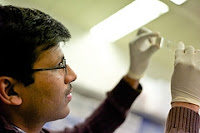A novel microfluidic probe technology being developed at the IBM Research – Zurich Lab could become a hot new tool in research laboratories and diagnostics labs.
 |
"Having one's vision and ideas vindicated and
acknowledged by long–term support is
a dream come true for any scientist,"
Govind Kaigala |
The European Research Council (ERC) has announced its grant winners for 2012. ERC Starting Grants aim to support promising young scientists to establish their own research team for independent research.
Applicants may be of any nationality, but they must be based at some European university or research entity, have 2–12 years of research experience following their PhD, and have a strong scientific track record in a field showing great promise.
Competition for ERC grants is fierce: only a little more than 10 percent of the submitted research proposals win the prestigious and generous monetary award each year.
Two of this year’s winners, Govind Kaigala and
Armin Knoll, hail from IBM Research – Zurich.
We first caught up with Govind Kaigala, Research staff member, who earned the award for his project, BioProbe. Later this week, we will interview Armin.
What does this award mean to you professionally and personally?
Govind: Professionally, this grant allows me to consolidate and expand my research activities while giving me the confidence to take on longer-term research topics, which otherwise I might have hesitated to tackle. The success of MFP will be a significant step forward as a tool that may be used in research and diagnostics—this could be akin to laser eye surgery, a technology also developed at IBM.
Personally, it provides me the opportunity to be creative!
 |
"BioProbe":
Local processing of tissues/cells |
What is BioProbe?
The BioProbe project will take advantage of our ongoing research activities on the microfluidic probe (MFP). The MFP uses nanoliter volumes of liquid to perform local biochemistries on cell, tissues and other biological surfaces at the micrometer scale.
One theme within the BioProbe being actively pursued is the staining of tissue sections with multiple molecular markers to obtain more information of higher quality for the precise diagnosis of cancer.
The objective of the BioProbe project is twofold: First, to mature the MFP technology to perform unique chemistry and physics at biological interfaces and, second, to apply this technology to address a few pertinent problems in pathology and cell biology through interactions with colleagues in the life sciences.
You competed in the life-sciences track for this award. Isn’t that a bit surprising, coming from IBM Research?
Yes, at first glance it may not seem obvious. My objectives and goals for the BioProbe are to develop next-generation tools for use in cell biology and tissue analysis. This needs ideas and techniques used in and inherent to the physical sciences, in particular micro- and nanotechnologies, and that’s why the IBM Research – Zurich Lab is a wonderful fit.
I’ve found that being at arm’s length from a problem gives you the necessary perspective that quite often helps bring much better resolution.
What outcomes can we expect?
I envision that the MFP will be available in the next several years for use in research laboratories and diagnostics facilities to assist in research activities. To this end, we are working with the University Hospital in Zurich, ETH Zurich and partners in the pharmaceutical industry. In addition, this grant will help train personnel who will be adept at working in multidisciplinary research environments while being exposed to both basic and applied biomedical research.
BioProbe is just the beginning; we have so many more ideas in mind. My vision is that the MFP will become a facilitator for investigating previously unapproachable problems in cell biology and pathology by providing multifunctional capabilities. A lot like a Swiss army knife!Labels: BioProbe, cell biology, European Research Council, Govind Kaigala, healthcare, IBM Research - Zurich, life sciences, microfluidic probe, nanotechnology, pathology


